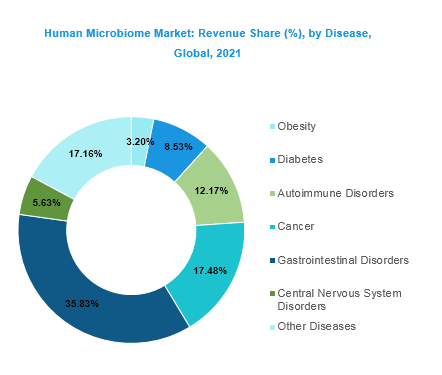Growth of the Microbiome: Understanding your Gut
Aman Kumar- Ph.D. Candidate
The Human Microbiome - An Introduction
The human microbiome consists of trillions of microbes that resides on the human body. With the advancements made in the field of sequencing, we have increased our understanding on the composition of the microbiome and the metabolic landscape of these microbial occupied niches. Several studies have linked the role of the microbiome in progression of disease like gastrointestinal (GI) diseases, cancer, diabetes, obesity and many more [1, 2]. Today, we can pinpoint the effect of many of these commensal microbes and microbiota-derived metabolites in modulating a certain disease [3, 4]. These findings have led to the increased interests in the field to develop methods for diagnostic and drug targeting purposes. Much work is still needed to achieve a more detailed understanding, as many bacteria from the human microbiome cannot be cultured and are genetically intractable with the current technology. We also lack the ability to identify all the metabolites produced by these microbes present in different niches [5].
Importance of Microbiome Research
The main factors contributing to the increased interest in microbiome research is derived from escalated life-style related diseases and the growing geriatric population [6]. The food we consume rapidly alters the microbiome and use of probiotics and prebiotics to promote microbiome health is positively correlated with improvements in the human health [7].
Current Market of Microbiome
The global human microbiome market, which includes diagnostics and therapeutics, is expected to grow with a compound annual growth rate (CAGR) of 21.89% from 2019 to 2027, with a total market value of $1.73 billion in 2027 [8]. The market of microbiome is divided in developing diagnostics and therapeutics. Geographically, the market in North America market is expected to grow at the highest rate, and research and development in the GI disorders space occupy the largest revenue share (Figure 1) [8, 9].


Figure 1. Source: Mordor Intelligence
Major Players in the Microbiome Space
With respect to disease indication, microbiome companies are operating in seven major categories: oral health, skin disease, intestinal health, clinical diagnostic, drug delivery, dietary supplements, and genomics (Figure 2). C3J Therapeutics is engaged in preventing dental infections by targeting harmful pathogens while leaving out the healthy mouth microbiome. Similarly, Naked Biome, Azitra, and Xycrobe are working on treating skin diseases via modulation of the skin microbiome. Major companies focused on developing therapeutics against gastrointestinal diseases include Enterome, Seres Therapeutics, Vedanta Biosciences, Symbiotic Health, Eligo Bioscience, Second Genome, and EpiBiome. These companies are largely focused on developing therapeutics against gastrointestinal disorders. Companies utilizing genomics aspects include uBiome, Epibiome, Microbiome insight, Metabogen, and CosmosID [10, 11]. High-throughput sequencing and the availability of large amount of data has opened up the possibility of using metagenomics approaches to identify a candidate microbe and precisely modulate the microbiome.

Figure 2. Source: CBINSIGHTS
Currently, multiple startups are entering microbiome space with reports indicating there as many as 120 companies investing in analyzing the microbiome [12]. According to global engage reports, the most active investors are Seventure Partners, Flagship Pioneering and BioGaia [13]. According to a report by Seventure Partners, over 2400 clinical trials relating to microbiome therapy were tested in 2018 alone and this number is continuously increasing every year [14].
Although, the development of diagnostics and therapeutics based on targeting the microbiome to treat chronic diseases is still in its nascent phase, many companies are offering prebiotic and probiotic supplements to keep overall healthy microbiome. For example, companies such as ISOThrive and MicroBiome Therapeutics develop dietary supplements to promote a healthy GI microbiome.
Another approach that is currently used in the clinic to treat recurrent Clostridium difficile infections in the gut is Fecal-Microbiota Transplantation (FMT). Oral or rectal transplantation of fecal contents from healthy donors has successfully treated 90% of patients with recurrent Clostridium difficile infections [14]. Currently, the process involves ingesting frozen fecal contents in pill form to preserve the microbial contents until reaching the targeted region of the GI tract [15, 16]. In light of accidents associated with FMT, more rigorous screening processes of the donor samples is recommended by the FDA to avoid any risks associated with the transplanted bacteria [17, 18].
Challenges and conclusions
Overall, microbiome-based therapies provide a huge market potential for treating acute as well as chronic diseases but still face several challenges during commercialization. The complexity and uniqueness of the microbiome between different individuals makes it difficult to develop a generic therapy. Most of the studies in the microbiome field that show microbial relations to certain disease is correlation-based and more basic science research is needed to understand the underlying cause of the disease for development of targeted therapy.
References:
- Cho, Ilseung, and Martin J. Blaser. "The human microbiome: at the interface of health and disease." Nature Reviews Genetics 13.4 (2012): 260.
- Shreiner, Andrew B., John Y. Kao, and Vincent B. Young. "The gut microbiome in health and in disease." Current opinion in gastroenterology 31.1 (2015): 69.
- Martín, Rebeca, et al. "Role of commensal and probiotic bacteria in human health: a focus on inflammatory bowel disease." Microbial cell factories 12.1 (2013): 71.
- Martinez, Kristina B., Vanessa Leone, and Eugene B. Chang. "Microbial metabolites in health and disease: Navigating the unknown in search of function." Journal of Biological Chemistry 292.21 (2017): 8553-8559.
- Stewart, Eric J. "Growing unculturable bacteria." Journal of bacteriology 194.16 (2012): 4151-4160.
- https://research.mordorintelligence.com/reports/human-microbiome-market
- David, Lawrence A., et al. "Diet rapidly and reproducibly alters the human gut microbiome." Nature 505.7484 (2014): 559.
- https://www.globenewswire.com/news-release/2019/07/23/1886350/0/en/Human-Microbiome-Market-Outlook-to-2027-Precision-Medicines-are-Increasing-the-Adoption-of-Human-Microbiomes.html
- https://research.mordorintelligence.com/reports/human-microbiome-market
- https://www.cbinsights.com/research/microbiome-startups-market-map-company-list/
- https://www.clinicalomics.com/magazine-editions/volume-6-issue-number-4-july-august-2019/mining-the-microbiome-microbiome-startups-are-proliferating-exploring-new-markets-and-colonizing-diverse-therapeutic-niches/
- https://www.biopharmatrend.com/post/91-big-investments-for-human-microbiome-research/
- https://www.global-engage.com/life-science/list-of-microbiome-companies-and-investors/
- Borody, Thomas J., Lawrence J. Brandt, and Sudarshan Paramsothy. "Therapeutic faecal microbiota transplantation: current status and future developments." Current opinion in gastroenterology 30.1 (2014): 97.
- https://www.labiotech.eu/features/gut-microbiome-research/
- Youngster, Ilan, et al. "Oral, frozen fecal microbiota transplant (FMT) capsules for recurrent Clostridium difficile infection." BMC medicine 14.1 (2016): 134.
- https://www.nbcnews.com/health/health-news/patient-dies-fecal-transplant-containing-drug-resistant-bacteria-n1017426
- https://www.cidrap.umn.edu/news-perspective/2019/06/fda-issues-alert-after-fecal-microbiota-transplant-death

